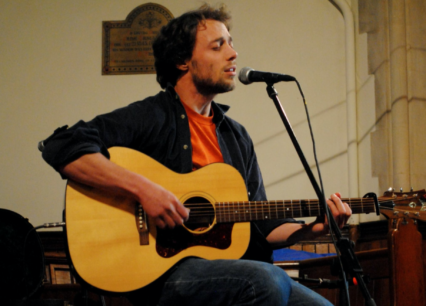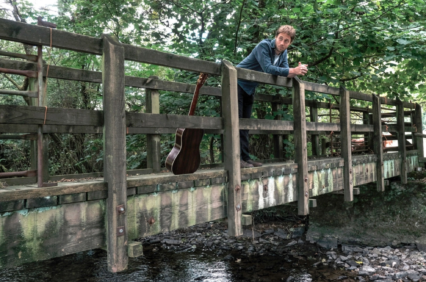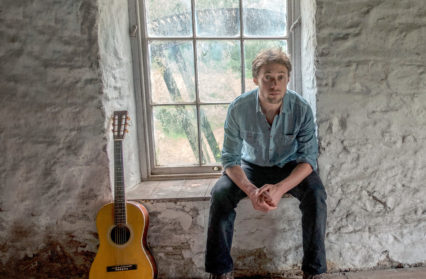Writer Sam Robinson explores the Cynefin Dilyn Afon, a Ceredigion folk project by his friend, musician and songwriter Owen Shiers.
It had been a slow start to the lambing that year. Long evenings sat on an upturned feed-tub watching and waiting. Then one morning came the sound of a single bleating lamb in the near barn, and soon enough the madness began in earnest, pacing between fields in your dreams and tying your laces before you wake. The lambing is often like a dream; an all-consuming world of its own, the details of which tend to slip from memory. But one moment still sits with me from that year, fresh as its morning. How was it then? The end was close, only a handful of ewes left to lamb, and the madness had slowed to a sort of gliding; breathing slower now, noticing the world again, the early spring flowers and the slight warmth of the breeze. I’d come into the house for morning tea. Sat down at the long table and turned my chair to face the sun coming in through the small windows, hot tea steaming in the sunlight. Close my eyes and breathe in the quietness of old stone and unseen birds outside. Then a sound grew into that quietness, drifting in gently and startling, landing deep in my heart. I sat there then held in exhaustion, modest sunlight and the song of a young man taking love advice from a blackbird, and knew I was on my way home. This was the first time I heard the voice and guitar of Owen Shiers, sounding out of the speakers in the next-door room.
 Since then I have followed Owen and his project Cynefin with some enthusiasm, which has lately reached its own lambing time so to speak, with the release of the album, Dilyn Afon. “Dilyn afon” is Welsh for “following a river”; the river in question being the Clettwr of Ceredigion, near to which Owen was raised. Cynefin is a word lacking any direct equivalent in English. Originally it described the trails worn out through the landscape by the habitual movement of animals, yet over time it has come to signify a particular sense of personal belonging, a kind of slow-grown instinctive familiarity with a place. It is a human experience that approaches the intimacy of entanglement and embeddedness in the land known only to animals.
Since then I have followed Owen and his project Cynefin with some enthusiasm, which has lately reached its own lambing time so to speak, with the release of the album, Dilyn Afon. “Dilyn afon” is Welsh for “following a river”; the river in question being the Clettwr of Ceredigion, near to which Owen was raised. Cynefin is a word lacking any direct equivalent in English. Originally it described the trails worn out through the landscape by the habitual movement of animals, yet over time it has come to signify a particular sense of personal belonging, a kind of slow-grown instinctive familiarity with a place. It is a human experience that approaches the intimacy of entanglement and embeddedness in the land known only to animals.
This particular cynefin follows a musical trail through the landscape and history of Ceredigion, with the course of his native river Clettwr at its heart. In the course of the album, in its flow of carefully wrought arrangements and textures, it is as if we are being shown every twist and turn of that river. One can feel the territory bristling in every instrument. However the guitar work carries an animistic quality of particular note, its intricate lines conjuring twisting branches of oak, running hare and birds in unharried flight.
And the words of each song reveal yet more layers of the place; the flow of wild flowers along the Clettwr’s banks, the colours of sunlight on the Teifi hills, two horses conversing about retirement, a bard chastising a tardy cuckoo, a matchmaking blackbird, a train ride with a beautiful thieving widow, heartache, a pennant lover, the tragic fate of a frog, a sailor’s hiraeth, a forbidden song to mourn a dead child, and a grand sea-bound farewell to Aberystwyth, before turning back at the last minute and heading for home.
This album is a kind of homecoming that reaches beyond the personal. In Owen’s own words, it is “the result of three years research and work. The project’s aim is to uncover lost voices, melodies and stories as it goes and give a modern voice to Ceredigion’s rich yet fragile cultural heritage – presenting forgotten and neglected material in a fresh new light.” There is a sense of precariousness to the world he loves, a world in which people and land are bonded close as family. In rearticulating its voices in the light of diverse musical influences gathered in his years away from home, Owen brings a vital freshness to his culture at a critical moment.
 Belonging is a delicate subject to speak of these days. In a post-industrial society increasingly characterised by scatteredness, and a world where thousands of people are being driven from their homes by war and acquisition, crossing borders only to be met with unwelcome from people spurred into reaction by their own damaged and fragile senses of belonging, Owen’s choice to frame his journey along the course of a river is significant. In naming the Clettwr Valley as his primary territory, rather than the album’s broader territories of Ceredigion or Wales, Owen invites us to think about our sense of place in a different way, asking not to which country do we belong, but rather to which river? The course of a river precedes and outlives the borders drawn up by history. In this the river claims primacy, and a sovereignty that demands deference. This sovereignty of the land precedes any peoples’ sense of belonging, and is something anyone can participate in regardless of where they have come from. In following a river, that is, in consciously getting to know a place deeply, we can begin to find our own place there. And with some patience, perhaps in time might arrive at something like that sense of cynefin.
Belonging is a delicate subject to speak of these days. In a post-industrial society increasingly characterised by scatteredness, and a world where thousands of people are being driven from their homes by war and acquisition, crossing borders only to be met with unwelcome from people spurred into reaction by their own damaged and fragile senses of belonging, Owen’s choice to frame his journey along the course of a river is significant. In naming the Clettwr Valley as his primary territory, rather than the album’s broader territories of Ceredigion or Wales, Owen invites us to think about our sense of place in a different way, asking not to which country do we belong, but rather to which river? The course of a river precedes and outlives the borders drawn up by history. In this the river claims primacy, and a sovereignty that demands deference. This sovereignty of the land precedes any peoples’ sense of belonging, and is something anyone can participate in regardless of where they have come from. In following a river, that is, in consciously getting to know a place deeply, we can begin to find our own place there. And with some patience, perhaps in time might arrive at something like that sense of cynefin.
Whilst Owen’s sense of belonging is rooted in his childhood, the deliberate journey undertaken as an adult in Dilyn Afonseems to have brought him into an even closer contact. In its deep listening and use of creativity to give voice to a place, the journey of this album is an example to any of us who wish to deepen our relationship with where we live.
When I first heard Owen’s music in that farmhouse kitchen three years ago I was lost and adrift, but something in his voice gave me hope and urged me on. The following week I took the mountain road north and down into the Dyfi valley. I have remained close to the river Dyfi since then, and have begun to follow it.












